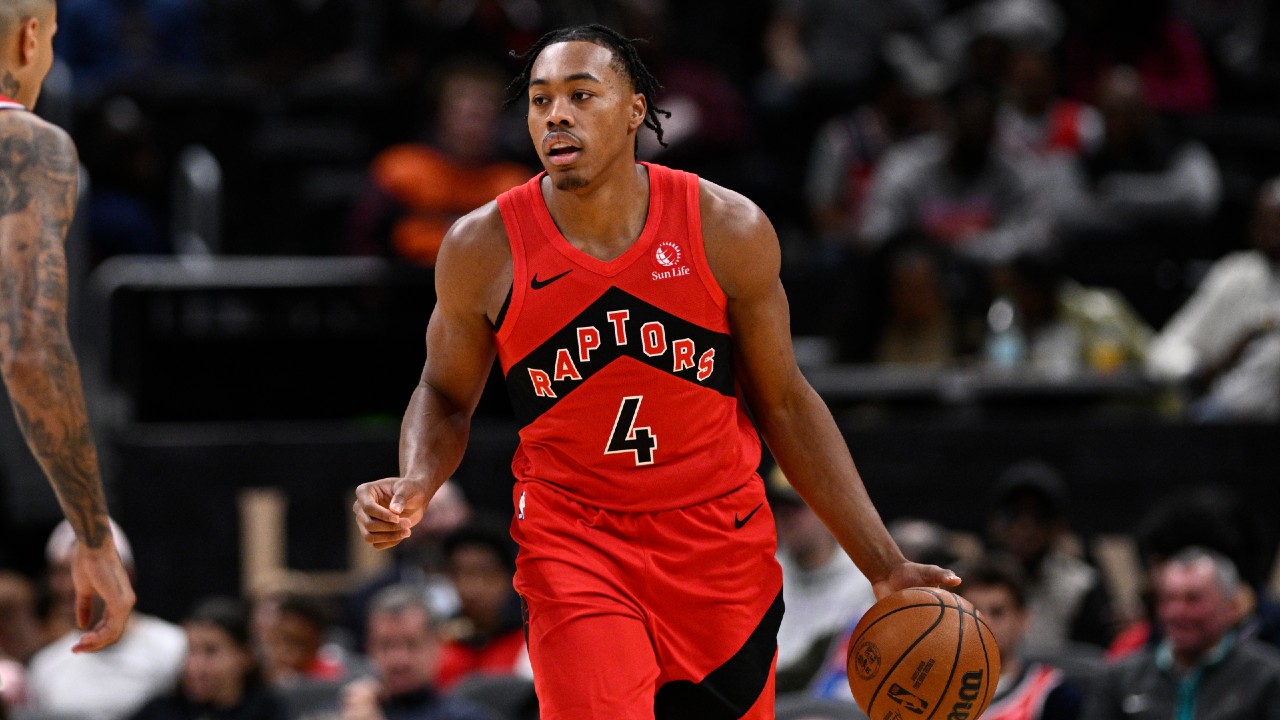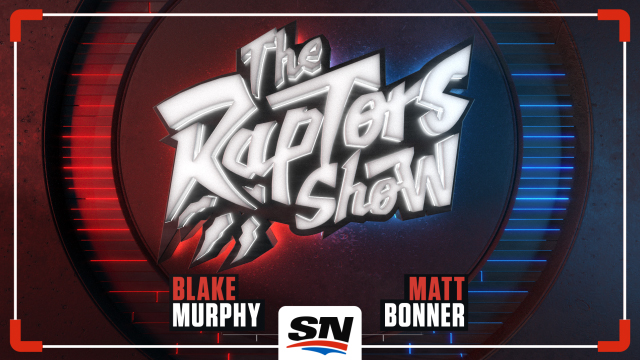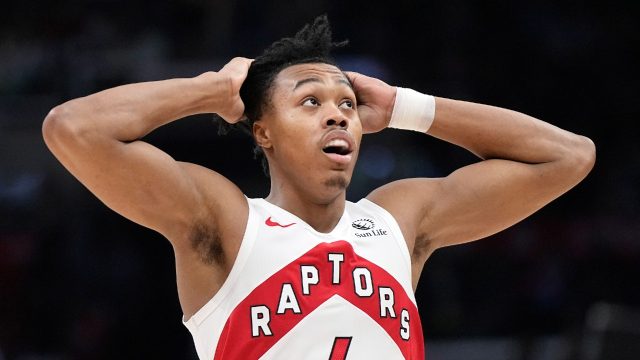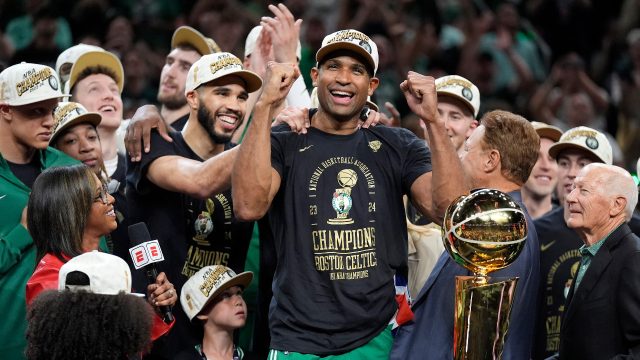
Play-in for the playoffs, or find a way to play into the NBA Draft lottery?
That is just one of the many questions surrounding the Toronto Raptors heading into the 2024-25 NBA season, one where the team is all-in on the rebuild, but looking for continued development from its young core.
Sportsnet’s NBA experts address that question and a few others ahead of Toronto’s season-opening game on Wednesday night.
What does success look like for the Raptors this season?
Michael Grange (Sportsnet’s Senior Basketball Insider): Can they develop the young talent on their roster and still finish in the bottom five of the league to give themselves a 42.1 per cent chance of drafting in the Top 4 this June and a 90.6 per cent chance of being in the Top 7? In other words, progress from Scottie Barnes in his first season as a true first option and unquestioned team leader; a nice development step from Gradey Dick in Year 2; evidence that RJ Barrett’s efficiency gains are real and that Immanuel Quickley can be a quality NBA floor general, rather than a really good shooter who plays point guard; plus some nice player development wins from the young crowd at the bottom half of the roster. If the Raptors can do all that while positioning themselves to draft a potential all-star to pair with Barnes long-term, then Raptors fans should be ecstatic.
Blake Murphy (Co-host of The Raptors Show): Success is twofold: The guys we know are a part of the long-term core improve and improve together; and they find a couple more guys who become a part of that core, too. Barnes, Quickley, Barrett, and Dick are the pieces you need chemistry to develop between, while someone(s) from the Shead, Walter, Mogbo, etc … group has to pop in a meaningful way. Other things matter — culture, offensive style, a defensive identity — but this year is all about seeing you invested in the right guys and learning who else deserves that investment.
Eric Smith (Raptors radio play-by-play): I don’t see the Raptors as a bottom-five team in the Eastern Conference. Thus, I think success is battling for one of the play-in spots. The key will be surviving the first quarter-plus of the season, which is a bear. If they can do that, playing meaningful games through the regular season and potentially even into the play-in or the postseason would be extremely beneficial and meaningful for the overall experience of this young core.
Vivek Jacob (NBA contributor on sportsnet.ca): Success will be defined by individual player development and head coach Darko Rajakovic being able to further establish his offensive and defensive principles. Masai Ujiri already made it clear that this is a rebuilding year and that removes any expectations as far as the win column is concerned. Development was at the core of Toronto’s success in the We The North era and how the young players from Scottie Barnes to Jamal Shead progress will be the most important measure.
Kai Gammage (NBA contributor on sportsnet.ca): Cooper Flagg (or Ace Bailey, Dylan Harper, VJ Edgecomb, Nolan Traore or anyone else from what projects to be a seriously deep NBA Draft class at the top). With the amount of money the Raptors are committing to Barnes, Quickley and Barrett, it’s hard to rationalize a tank, but this team’s ceiling isn’t nearly high enough. As Masai Ujiri said at Raptors media day, rebuilding is the name of the game this season, and that should start with an infusion of serious young talent from a stacked draft class. If the three core players build chemistry and gel along the way, that’s icing on the cake.
Zulfi Sheikh (NBA contributor on sportsnet.ca): Any team on its path towards being competitive has to carve out an identity along the way. Which is exactly what the Raptors need to accomplish by the end of this season. Success won’t be about wins or losses, rather what defining trait we recognize this roster by. Last year’s team was 24th on offence and 25th on defence —listless on both ends of the floor. This year’s team needs to be good-to-great on, at least, one side of the ball. Whether it’s through their high-paced ball movement offence or newly implemented heavy on-ball pressure defence, the Raptors need to identify a calling card.
What is the next level for Scottie Barnes following his All-Star season?
Grange: If Barnes is going to be good value for everything the Raptors have invested in him, he needs to become an all-NBA level player. This will be almost impossible to do on a bad team, and it would actually help the Raptors’ cause long term if Barnes doesn’t make an all-NBA team this year, thus avoiding the escalators that turn his five-year, $225-million contract extension into a $270-million ‘Supermax’ and the salary-cap complications that come with that. All that said, the biggest areas for Barnes’ growth are how he handles being the face of a team that could struggle over a long season. Can he remain locked in and relentless in Game 55 when a play-in spot seems like a distant possibility? Numbers-wise, another jump in his three-point shooting (he went from 29 per cent in Year 2 to 34 per cent last season; league average was 36.7) would be huge, and given how physically he can play, he should get to the free-throw line six or seven times a game (it was four last season). Hit those marks and Barnes could slash 23P/8R/7A with three ‘stocks’ (combined steals and blocks), which would be all-NBA numbers on a competitive team.
Murphy: Barnes is capable of pushing for All-Defense inclusion. Could he aim for All-NBA? Sure. He has the overall talent level to be that kind of guy at some point, and his contract escalators incentivize it. Those spots tend to go to players on winning teams, though, and Barnes can only control a part of that. Continued growth as a shooter and pick-and-roll operator will be essential long-term, as will the leadership component. From a measurable standpoint, this is a blocks-and-steals monster who can guard four positions and check the best players in the league, and the Raptors badly need him to be that type of high-end tone-setter on defence to be competitive.
Smith: We already know what Barnes can do on the court as a scorer, rebounder, defender and more. And hopefully, he gets even better in all those areas. The next step in his evolution is his leadership both on and off the floor. I’ve already seen great signs and strides through the preseason and some limited glances I was privy to during training camp. I’ve been impressed and I hope Barnes continues to show those strides even more throughout this season.
Jacob: Playing at or near an All-NBA level. Barnes showed he can be an excellent two-way player for stretches last season and playing at that level for all of this season will be a huge step. Specifically, that would mean showing advancement in his individual offensive scoring package, cutting down on silly turnovers, and improving further as a perimeter defender because we know he already excels at helping protect the rim or using his strength to defend in the post. Leadership is also going to be an important measure in his first full season as the face of the franchise.
Gammage: I’d like to see Barnes develop as a self-creator. He was one of the least-effective isolation scorers in the league last season, and though the Raptors likely don’t want that to be something they lean on in their more ball-movement-heavy scheme, he needs to take another step as a scorer and be able to take over a game on his own. He scored 0.7 points per possession in isolation and shot 36.3 per cent on those looks, which put him in the 18th percentile league-wide. Barnes also needs to take a step in pull-up shots. He only hit 25 of his 89 (28 per cent) pull-up attempts last season (per Synergy). If he’s going to be running the offence, that needs to be a part of his game.
Sheikh: It’s no secret the Raptors are asking the fourth-year forward to do just about everything this season, and that includes defending both on and off the ball. In the past, Barnes has been elite as a backline sweeper and help defender but has struggled keeping up at the point of attack. With the Raptors’ new defensive scheme and the lack of stout perimeter defenders in the starting lineup, that pressure falls on him. If Barnes can help improve a defence that was giving up the sixth-most points-per-game last year while keeping up his offensive production, a second (this time not as an injury reserve) All-Star nod should be on the horizon.
Which player will be the X-Factor for this team?
Grange: Jakob Poeltl. The veteran Austrian centre stabilizes everything defensively and — for a non-shooting big — is an excellent safety valve and facilitator on offence. The Raptors went 4-28 when Poeltl was out of the lineup last year. It wasn’t all because of him — the Raptors completely shut down after he and Barnes got hurt one game apart last March — but he’s shown to be a massive swing factor, both because of his competence and Toronto’s lack of depth at centre. Toronto went 2-9, for example, when Poeltl sprained his ankle in early January and they still had play-in aspirations. Since the Raptors acquired Poeltl at the trade deadline in 2023, they are a borderline .500 team when he plays and candidate to win the draft lottery when he sits. A well-timed hamstring pull by Poeltl could hold the key to the Raptors’ long-term future.
Murphy: Jakob Poeltl. Not from an on-court standpoint, necessarily, because we know who Poeltl is with more certainty than maybe anybody on the roster. Short of Barnes, I’m not sure the absence of any player would be felt more than Poeltl. And that’s why he gets the X-factor — if the Raptors took offers on Poeltl, there would be league interest, even in a tougher tax-and-apron environment. In addition to whatever they got back for him, losing Poeltl would cost them at least a few wins down the stretch, which could be relevant (see next question). So, I guess I’m saying the trade market for Poeltl will be the X-Factor, more than Poeltl himself.
Smith: Immanuel Quickley. This will be his first full season as a primary / full-time point guard in the NBA. The Raptors have shown a ton of faith in him — not only handing him the reins but rewarding him with a boatload of money as well. He, along with Barnes and Barrett, will be charged with the task of taking this team into its next chapter, and Quickley will be responsible for guarding and challenging some of the best players in the league on a nightly basis. I look forward to seeing his evolution and I’m already impressed with his work ethic, attitude and personality.
Jacob: RJ Barrett will be the X-Factor for this team. He was extremely efficient as a scorer after coming over to Toronto and maintaining that lofty standard (relative to his previous career marks) would be an impressive feat. Considering Toronto’s lack of defensive wing options, how Barrett comes along as a perimeter defender will have a huge bearing not only on the effectiveness of the starting five but also his long-term outlook with the team.
Gammage: Jakob Poeltl. I believe that the players Toronto selected at the NBA Draft are a sign of the type of team identity they want to forge this season. Ujiri and Rajakovic all but confirmed it at media day by touting their goal of seeing defensive strides from a team that gave up the sixth-most points-per-game last season. In selecting point-of-attack defenders, they sought to force more players to funnel into the lane and take on the rim-protecting prowess of Poeltl. The Austrian big gave the Raptors a marked boost on defence when he was on the court, giving the team a plus-4.7 per cent boost in defensive rating. The Raptors’ defensive growth starts with their new perimeter defenders, but it ends with Poeltl. The team clearly trusts him to be the centrepiece in the middle, and if the goal this season is to make strides on that end, Poeltl is the key to that growth.
Sheikh: The Raptors haven’t had adequate point guard depth since the days of Fred VanVleet backing up Kyle Lowry. Which is why having Davion Mitchell on the team to lead the second unit is going to be a meaningful addition. Aside from his well-recognized defensive capabilities, the fourth-year guard is a highly-disciplined passer who rarely makes mistakes when operating an offence. And when he inevitably is inserted alongside starters like Barnes or Quickley, he’ll fit right in, leveraging his experience of playing with De’Aaron Fox and Domantas Sabonis in Sacramento.
Toronto’s win projection is 29.5 (per BetMGM) … over or under?
Grange: Take the under, though it might be hard to lose 50-plus games in the East when nearly a quarter of your starts come against Brooklyn, Washington, Detroit, Charlotte and Chicago — teams that should be determined to tank or simply aren’t very good. There are two factors that could tip the balance towards the Raptors winning 29 games or less: The first is that the first 25 games of their schedule are incredibly difficult, with 22 of those coming against teams that won at least 46 games last season, none of which project to be worse, save for perhaps the Los Angeles Clippers, who the Raptors play in Los Angeles. They play 12 of their first 20 games on the road. Of the three games in the early going against teams with losing records last season, two of them are on the road. Certainly, the Raptors’ final third of the schedule is much easier, but if the Raptors are, let’s say, a 15-win team at the all-star break — not out of the realm of possibility — you would think they would be fully lottery focussed at that point, and avoid a surge to the finish.
Murphy: I’ll give a tepid over. I picked them for 35-47 on an offseason podcast, and while I don’t feel great about that number, I’m stuck with it. And I think they’re probably a 33-35 win team on true talent. The complication comes from incentives — the schedule early is incredibly tough, and with a strong draft ahead and the team finally using the “rebuild” word, it’s possible they pull the chute early ahead of a March and April schedule where they could do some damage in the reverse standings.
Smith: Over. Last season the Raptors dealt with numerous trades, injuries and off-court controversy and tragedy. Yet, they still somehow managed to get to 25 wins. Can they not add five or more to that total this year? I think so. The team will play an unselfish style that should balance the scoring on many nights. But more importantly, I believe Toronto will make its mark on the defensive end with how hard they play. They will be a pesky team to play more often than not.
Jacob: Under. While I believe this team has the talent to win more than that, the first 25 games of the season are brutal in terms of quality of opponent and the next 25 aren’t much better. If the team is well outside looking in for just the play-in, it should force the team’s hand into prioritizing a quality draft pick in what is expected to be a loaded class.
Gammage: Under, and you can lock that up. They may have tanked near the end of last season, finishing with only 25 wins as they made a run to try and keep their high pick, but this current team is nowhere near five wins better than the one we saw at different points last year — especially not with an improved Eastern Conference. The Raptors shouldn’t want to win this season. The ceiling for this current team isn’t close to contention, and the only way to improve it (considering the team’s cap holds) is by hitting home runs at the draft. A middling lottery pick won’t do that for them. There’s a clear incentive to be bad for a class like this next one, and the Raptors shouldn’t let that opportunity slip by.
Sheikh: Barring injuries or a purposeful tank job, the talent of the Raptors roster is enough to win at least 30 games. It took a lot — injuries, personal absences, a player scandal and roster-turning trades — for the Raptors to sink down to 25 wins. With a bit of stability and health, especially through the team’s top eight players, five more wins this season seems like a reasonable goal. How much they hit the over by will depend on how quickly the team gels together and what impact the depth of the roster has.








